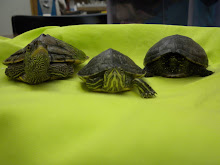Hey, it's almost Banned Books Week, and you know what that means - time for the loonies to come out of the woodwork and tell you what you can and cannot read*! We hate to be left out, so here are a few books you should absolutely NOT** read:
First in the news this week is
this article, a nicely slanted and wildly inaccurate diatribe against several fantastic books. What's especially 'encouraging' about this article is that the school board is LISTENING to this guy. Here is
Laurie Halse Anderson's response. Of course, we know we can't trust HER, she wrote one of them! It's not as if we
like any of her stuff anyway.
Anderson mentions the next book for your burn pile,
The Absolutely True Story of a Part Time Indian, by Sherman Alexie. This book has been
banned by the wise folks on the Stockton (MO) school board, not just from the school curriculum, but from its library as well. Because it contains profanity. And teenagers have never heard profanity. And it's not as if it's realistic. In an autobiography. Of a teenager.
Hey, but we don't want you to think we can't come up with idiocy on our own! No, sir, we can be quite the loons all by ourselves.
We just finished:
- the sequel to "Streams of Babel", which we swooned over. You certainly mustn't read either book. Two of the main characters, minors, are involved with hacking computers and spying. They are completely (albeit justifiably) disrespectful to some of the adults in their lives. In this sequel, they have dropped out of school and are living pretty much alone, with just a nurse to somewhat-supervise them. And then there are the four teens infected with a terrible virus by bioterrorists, not related to each other, living under the same roof, again with basically just a nurse around. WAY too much talk of ways germs can spread, if yaknowwhaddamean. Because, you know, we shouldn't expect hormones to be a topic of thought or discussion for teenagers. These kids also don't listen to the adults around them. They really should just sit back and watch TV, and let the big people take care of the terrorists. Who may still be interested in them, btw. Very interested.
We all know the government has only our best interests at heart, and we certainly don't want children reading about subversive adults, so stay away from:
Rachel and her mother live on "The Property", an estate where her mother works as a sort of housekeeper, located dangerously close to "The Line". The Line is a force field, part of the National Border Defense System, keeping the bad things out of the country and the good things in. At least, that is what everyone has been told.
Rachel, of course, can't leave well enough alone, especially when she receives what may be a message from the other side of the Line. What is with all these teens who refuse to blindly follow adults' instructions? If this trend continues, we will have a generation of young people who think for themselves, and are willing to accept the consequences if they are wrong. We can't have that, can we?!
Goodness, there are just so many books out there that people shouldn't read***. We may have to just cover a few each day, knowing we will only hit the tip of the iceberg.
In the meantime, and in all seriousness, here is our take on books with non-Pollyanna content - and this is our take, not that of the establishment in which we reside, blah, blah, blah.
Parents have the right to have a say in what their kids do or do not read. They are their parents. They do NOT have the right to decide what other kids do and do not read. They are not their parents.
Digging ourselves slightly deeper...If a teacher feels strongly enough about the merits of a challenged bok that he still wants to use it in a required class, then he should provide students a different option if their parents want one. Parents in such circumstances should be willing to stop with what their child is reading, and not insist that everyone in class read the same thing (and with the millions of great books out there, why should they all read the same thing? If your goal is class discussion, why not offer three or four books on the same topic, and let the kids compare?)
Of course, there are always those people who will complain about any book. In our library alone, we have had patrons who objected to books with: talking animals, romance of any sort, magic, religious content, defiance against parents or other authority figures, violence, mention of the Holocaust, and death of a person or animal. If the subject of the class is, say, the Civil War, you are going to have trouble finding good quality books don't contain one or more of the above. How do we draw the line between a parent's rights concerning their own child, and where those rights infringe on other students' rights? Your thoughts?
* If you do not 'get' sarcasm, please stop reading here.
** unless, of course, you prefer to think for yourself and make your own informed choices. In which case, carry on.
*** One of the commentors on one of the above articles seems to be under the impression that the ALA's list of banned books is there so that people will know what books to take out of their libraries. Aaargh! And again we say, aaargh!!!









